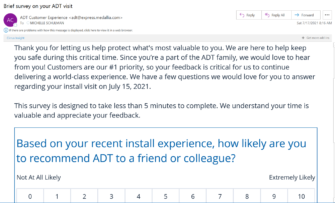Stop Talking About Donor Experience. Start Measuring (and Acting on) It.
Do you really think the donor experience matters?
We’d argue the only way to answer this question is by defining experience, otherwise it feels amorphous and fuzzy.
An interaction with your brand creates an experience. That experience creates a judgement by the human being on the receiving end– your donor/advocate/supporter. Those judgements add up over time to create mental credits or debits in the tiny, mental bank account residing within your supporter’s brain. That first year retention is woeful tells us most charities create a huge deficit in a really short period of time with most people. Yikes…
An experience creates judgements – e.g. the interaction was good, bad, in-between. Judgements can be measured.
This leaves an awful lot to measure and manage that goes unmeasured and unmanaged by the vast majority of nonprofits.
We’re not talking about the one-off survey to ask a bunch of random questions where the data never gets used nor the faux, garbage survey designed to promote response to an appeal.
We’re talking about what you, yourself experiences regularly in your non-fundraising life. Corporate brands asking for your feedback after an interaction.
(Note: Corporate brands don’t know all. This likelihood to recommend question, also referred to as Net Promoter, is absolute garbage. Why? It’s not trying to measure whether I will actually recommend their service and in fact, does an awful job of predicting that. It is trying to measure my loyalty to the brand, which should predict retention. It does an awful job of that too. But, it’s simple, easy and at face value, seems like it might be a good question)

This survey from the security firm ADT came within 24 hours of the install process. It is automated, which any charity can do – services exist in abundance and they are cheap. But simply asking how many people clicked this and filled it out misses the point and value.
The data produced by this had value in 3 ways.
- It identifies issues at the individual customer level. If a person says they had a crappy experience and their lifetime value is $720 (using a charity figure that is reasonable) and you can do an automated, triggered email follow up that apologizes and increases the likelihood you see the $720 does it matter if one person or 10,000 persons answer it. The reality is you’ll get far more people answering this than responding to your appeal to put it into perspective.
- Training needs for the individual technician. The survey questions aren’t random (even if they suck, like the first one). It goes on to ask about the technician and gets separate measures for the different aspects of the overall experience that matter to my satisfaction and likelihood to stick around. Was he knowledgeable in answering the questions, was he professional in demeanor, did he clean up, did he explain how to operate the system, etc. Any bad rating here gives the company critical training information. They can and should tie compensation to these scores.
- System wide improvement in process. A small sample – i.e. enough folks answering the question – gives aggregate data to see where there are systemic issues that get beyond a few unruly customers or bad techs. There are many broken parts to any system or process if only we walk a mile in the user’s shoes.
We’ve said this before and we’ll say it again. If you care about raising money, and more of it, and doing it for a solid return then you have to measure and manage the business in all the ‘soft’ crevices of online checkouts, event registrations, donor service interactions, telefundraising calls, F2F signups…
These interactions make or break your business. There is data galore to be had, it isn’t soft and fuzzy. It can be systemized and automated and cost is not a barrier, it’s an excuse that is only outdone by the pile of other excuses.
Does ADT care more about its customers than you care about your donors? I doubt it. That only leaves a pile of excuses and since they are all meritless, pick your favorite while having one hand firmly pressed on the mute button of experience and another holding the back door open for all those donors exiting.
Kevin


